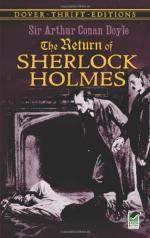“No names, please!” said Holmes, as we knocked at Gilchrist’s door. A tall, flaxen-haired, slim young fellow opened it, and made us welcome when he understood our errand. There were some really curious pieces of mediaeval domestic architecture within. Holmes was so charmed with one of them that he insisted on drawing it in his notebook, broke his pencil, had to borrow one from our host and finally borrowed a knife to sharpen his own. The same curious accident happened to him in the rooms of the Indian—a silent, little, hook-nosed fellow, who eyed us askance, and was obviously glad when Holmes’s architectural studies had come to an end. I could not see that in either case Holmes had come upon the clue for which he was searching. Only at the third did our visit prove abortive. The outer door would not open to our knock, and nothing more substantial than a torrent of bad language came from behind it. “I don’t care who you are. You can go to blazes!” roared the angry voice. “Tomorrow’s the exam, and I won’t be drawn by anyone.”
“A rude fellow,” said our guide, flushing with anger as we withdrew down the stair. “Of course, he did not realize that it was I who was knocking, but none the less his conduct was very uncourteous, and, indeed, under the circumstances rather suspicious.”
Holmes’s response was a curious one.
“Can you tell me his exact height?” he asked.
“Really, Mr. Holmes, I cannot undertake to say. He is taller than the Indian, not so tall as Gilchrist. I suppose five foot six would be about it.”
“That is very important,” said Holmes. “And now, Mr. Soames, I wish you good-night.”
Our guide cried aloud in his astonishment and dismay. “Good gracious, Mr. Holmes, you are surely not going to leave me in this abrupt fashion! You don’t seem to realize the position. To-morrow is the examination. I must take some definite action to-night. I cannot allow the examination to be held if one of the papers has been tampered with. The situation must be faced.”
“You must leave it as it is. I shall drop round early to-morrow morning and chat the matter over. It is possible that I may be in a position then to indicate some course of action. Meanwhile, you change nothing—nothing at all.”
“Very good, Mr. Holmes.”
“You can be perfectly easy in your mind. We shall certainly find some way out of your difficulties. I will take the black clay with me, also the pencil cuttings. Good-bye.”
When we were out in the darkness of the quadrangle, we again looked up at the windows. The Indian still paced his room. The others were invisible.
“Well, Watson, what do you think of it?” Holmes asked, as we came out into the main street. “Quite a little parlour game—sort of three-card trick, is it not? There are your three men. It must be one of them. You take your choice. Which is yours?”
“The foul-mouthed fellow at the top. He is the one with the worst record. And yet that Indian was a sly fellow also. Why should he be pacing his room all the time?”




